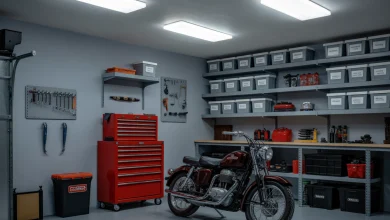The Complete Guide to Residential Electrical Services
Your home’s electrical system is an essential part of daily life, powering everything from your lights and appliances to heating and cooling systems. Maintaining and upgrading this system is crucial to ensuring both safety and convenience in your household. Whether you’re dealing with a minor issue or planning a major renovation, understanding the scope of residential electrical services can help you make informed decisions and ensure that your home is in good hands.
What Are Residential Electrical Services?
Residential electrical services encompass a broad range of tasks aimed at installing, maintaining, and repairing electrical systems within a home. These services are provided by licensed electricians who specialize in residential properties, ensuring that homes meet safety standards and function efficiently. From wiring new homes to performing routine maintenance, residential electricians play a key role in keeping your household powered and safe.

Types of Residential Electrical Services
Homeowners may require various types of electrical services depending on their needs. Below are some of the most common services offered by residential electricians:
- Wiring and Rewiring: Whether you’re building a new home or upgrading an older one, electricians handle the installation of wiring for your entire electrical system. Rewiring is often necessary for older homes to meet modern electrical standards and safety codes.
- Electrical Panel Upgrades: An outdated or inadequate electrical panel can lead to frequent circuit breaker trips and limit your home’s capacity to handle new appliances. Upgrading your electrical panel ensures that your home can meet increased electrical demands safely.
- Lighting Installation: Residential electricians install all types of lighting, from recessed lighting to chandeliers and outdoor lighting. Proper lighting installation enhances both the functionality and aesthetic appeal of your home.
- Outlet and Switch Installation: Electricians install and upgrade outlets and switches throughout your home, including the addition of GFCI (Ground Fault Circuit Interrupter) outlets in areas like kitchens and bathrooms for added safety.
- Electrical Inspections: Regular electrical inspections help identify potential hazards such as outdated wiring, faulty connections, or overloaded circuits. These inspections are crucial for ensuring that your home remains safe and compliant with local codes.
- Ceiling Fan Installation: Ceiling fans help improve air circulation and energy efficiency in your home. Electricians can safely install and wire ceiling fans, ensuring they work correctly and are securely mounted.
- Home Automation Integration: With the rise of smart home technology, residential electricians can install and integrate automated systems, such as lighting controls, thermostats, and security systems, giving you greater control and convenience.
- Emergency Electrical Repairs: When electrical issues arise unexpectedly, such as power outages or sparking outlets, residential electricians provide emergency repair services to restore safety and functionality to your home.
Why You Should Hire a Licensed Electrician for Residential Electrical Services
Electrical work is highly specialized and comes with significant risks if not handled correctly. Here are the key reasons why you should always hire a licensed residential electrician for your home’s electrical needs:
- Safety: Electricity is dangerous, and improper handling can result in serious injury, fires, or even fatalities. Licensed electricians have the training and expertise to perform electrical work safely, minimizing these risks.
- Compliance with Building Codes: Electrical work is subject to local, state, and national codes to ensure safety and functionality. Licensed electricians are knowledgeable about these codes and will ensure that all work is compliant, helping you avoid potential legal issues and failed inspections.
- Long-Term Reliability: Poorly installed electrical systems can lead to frequent malfunctions, costly repairs, and shortened lifespans for appliances. A licensed electrician ensures that your electrical systems are installed correctly, offering peace of mind and long-term reliability.
- Warranty Protection: Many electrical components come with warranties that require professional installation to remain valid. Hiring a licensed electrician protects these warranties, ensuring that you can take advantage of them if needed.
Common Signs You Need Residential Electrical Services
It’s important to recognize when your home’s electrical system may need professional attention. Here are some signs that it’s time to call a residential electrician:
- Flickering or Dimming Lights: If your lights flicker or dim when you use other appliances, it could be a sign of a wiring issue or an overloaded circuit.
- Frequent Circuit Breaker Trips: Circuit breakers are designed to protect your home from electrical overloads. Frequent tripping indicates that your system may be overloaded or experiencing a fault.
- Sparking or Warm Outlets: Outlets that feel warm to the touch or emit sparks are clear indicators of electrical problems that need immediate attention.
- Buzzing Sounds: Unusual sounds, such as buzzing or humming near outlets or light fixtures, often indicate loose wiring or faulty connections.
- Outdated Electrical System: Homes with old wiring, aluminum wiring, or outdated electrical panels are more prone to electrical hazards and may need upgrades to meet modern standards.
- Burning Smell: A burning smell near outlets or electrical appliances is a serious red flag. Turn off the power and call an electrician immediately to investigate the issue.
How to Choose the Right Electrician for Your Residential Needs
Choosing the right electrician for your residential electrical services is key to ensuring high-quality, safe, and lasting work. Here are some tips to help you find the right professional:
- Check Licensing and Insurance: Always verify that the electrician is properly licensed and insured to perform residential work in your area. This protects you in case of accidents and ensures the electrician is qualified.
- Look for Experience: Choose an electrician with experience in residential projects similar to yours. Whether it’s rewiring, lighting installation, or smart home integration, experience matters.
- Read Reviews and Ask for References: Look for electricians with positive reviews and ask for references from past clients. This gives you a sense of their work quality and customer service.
- Get a Detailed Estimate: Before work begins, request a detailed estimate that includes labor, materials, and any potential additional costs. This helps you understand what to expect and ensures there are no surprises.
- Check Availability for Emergency Services: It’s a good idea to hire an electrician who offers emergency services, so you know help is available when you need it most.
Your home’s electrical system plays a critical role in keeping your household running smoothly and safely. From routine maintenance and inspections to major upgrades and emergency repairs, residential electrical services cover all your home’s electrical needs. By hiring a licensed electrician, you ensure that all work is done safely, efficiently, and in compliance with local codes. Don’t wait until an issue arises—schedule regular inspections and upgrades to keep your home’s electrical system in top shape.




